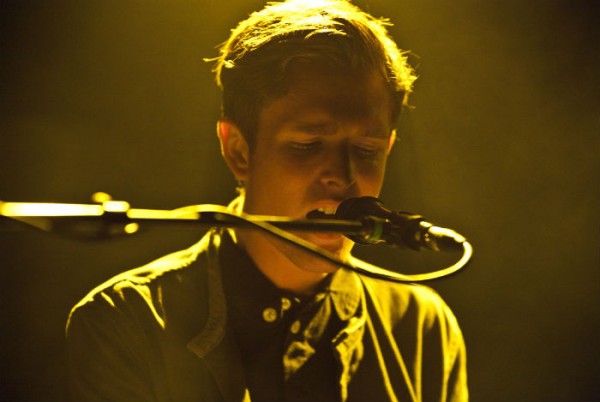Words by Marley Lynch
New York City — James Blake’s sound is one which relies on the ache provoked by tension and release. His songs develop slowly and reluctantly, building apprehension with intricate syncopations followed by a weighty stillness that can last as long as three or four seconds before delivering a relieving burst of drum’n’bass. The wait is powerful; his silent moments are reciprocated with an overwhelming quiet, as listeners hold their breath. Is it this compulsion that keeps fans hooked, or the quality of the music Blake actually delivers?
The man is a master of suspense and poised discomfort. On March 14th at the Music Hall of Williamsburg, he sauntered casually onstage to his first US set – one that had sold out in less than 25 minutes. It was his first time stepping foot in America. He was greeted with a cacophony of cheers, hoots, and (at times) lewd comments, but never lost his composure. “Oh, hi,” he said calmly. “I feel really welcome.” He sat nonchalantly in front of his fans, his body language betraying none of the anticipation that buzzed throughout the room.
www.jamesblakemusic.com
Fans eagerly awaited the first notes, impatient to discover whether he would play the garage, dubstep-influenced songs from his earlier EPs like CMYK or Klavierwerke, or stick to the austere, sparse chords of his self-titled debut, released last month on Universal Republic. Indeed, the 22-year old rising star has moved away from his role as a beat producer, instead presenting himself as the sincere frontman and singer/ songwriter of an emotionally raw full-length album. Blake’s live band was comprised of percussionist Ben Assister and guitar-and sampler-operator Rob McAndrews from the British band Airhead, complemented by his own eerie voice and deftly minimalist piano playing.
Kicking off with the somber, tender “Unluck,” it was immediately clear that his set would be morose and practically mournful. During some songs, such as the gloomy “Wilhelms Scream,” he remained practically immobile, barely moving his lips, hands in his lap, as his feet orchestrated the pedals of one of the two keyboards onstage. A theatrical blues man, Blake knows how to put all the focus on the music and effectively made the 550-person venue feel like an intimate jazz club.
It is always a pleasure to see how the recorded production of musical artists, particularly those as bedroom-y and vulnerable as James Blake, will translate to their live performances. In this case, Blake delivered an improved version of “Lindesfarne I and II,” rather acoustic for him and (thankfully) less digital than the album version, whose blips and beeps often come close to sounding dissonant and noisy. On the other hand, “I Never Learnt To Share” – which is a standout track on the LP – was lackluster, too heavy on the bass and too light on the human touch.
Despite the synthetic precision of the performance, the music pulled on heartstrings with its emotional lyrics and blues compositions. Most of these are original creations, barring the last two songs: his beautiful rendition of Feist’s “A Limit To Your Love,” and his haunting encore, a cover of Joni Mitchell’s “A Case of You.” It’s safe to say that this concluding piece, delivered by just Blake, left every audience member with the chills.
www.jamesblakemusic.com
TheWaster.com | Brooklyn
03.14.11



